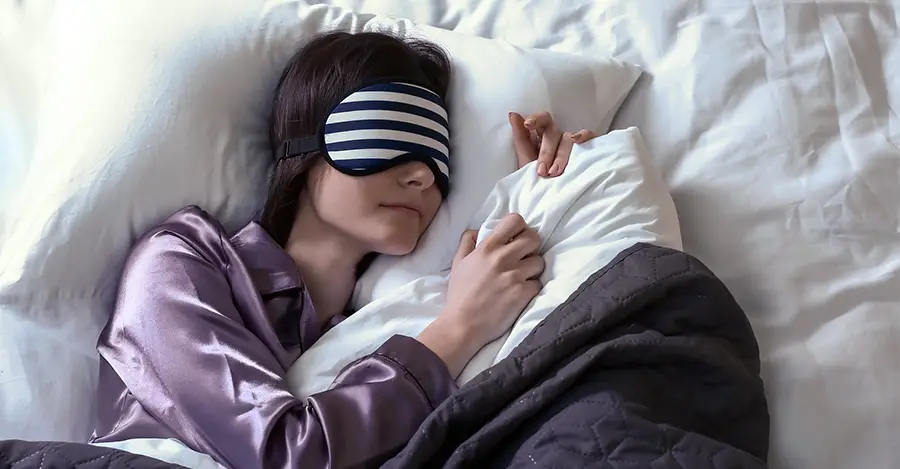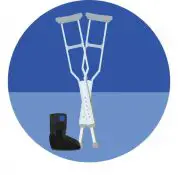10 Ways To Help You Manage Sleeping Problems While Recovering On Crutches
- Last Update:
According to a recent study that analyzed people with spinal cord injuries, it was determined that 58.8% of survey respondents indicated that they had a sleep problem. This study is one of many that has shown that those suffering from injuries struggle with poor sleep.
If you’re an individual suffering from sleeping problems while recovering on crutches, you’ve come to the right place. Our blog delves beneath the surface to share expert findings on ways that help you manage sleeping problems during your recovery.
Effects Of Lack of Sleep And Poor Quality Sleep

In the 21st century, most people don’t get enough sleep, with 70% of adults reporting insufficient sleep at least one night every month.
With busy work days, school lives, and more people staying up all night, it’s unsurprising that people suffer multiple effects from lack of sleep and poor sleep quality.
In the short term, it’s believed that lack of sleep can affect a person’s mood, judgment, and ability to learn and retain knowledge. It can also increase an individual’s chance of sustaining injuries as their cognitive function is impaired by poor sleep quality.
Other studies have also found that lack of sleep can lead to emotional distress, performance deficits, bodily pain, reduced quality of life, and increased stress.
In the long term, continued poor-quality sleep patterns can lead to an individual becoming obese, developing cardiovascular disease and diabetes, and potentially dying before their time.
Additionally, people with inadequate sleep are an estimated 17 times more likely to experience anxiety symptoms and ten times more likely to have signs of depression.
Moreover, a growing body of scientific research indicates that poor sleep raises the risk for suicidal behavior, especially among adults.
10 Ways To Help You Fix Sleeping Problems
When using crutches to aid in your recovery from an injury, finding ways to speed up your healing is crucial. Getting enough sleep is one of the best ways to ensure you heal faster.
To help you with this, we have listed ten ways to fix your sleeping problems that are tried, true, and likely to work.
1. Manage Main Problems That Cause Sleeping Issues
Unfortunately, many of your everyday problems can affect how well you sleep each night. That’s why one of the best ways to recover when using crutches is to manage your main problems that cause sleeping issues.
There are a few ways you can do this. For example, many people find that meditation before bed helps reduce anxiety and stress. According to a recent study, mindfulness-based therapy (meditation) helps to reduce stress, depression, and anxiety.
Additionally, if you’re experiencing pain from your injury, it’s a good idea to follow your doctor’s advice if you want to sleep well. So if your physician says that you need rehabilitation and to exercise, ensure you’re doing so to sleep better. Essentially, the less pain you feel, the better you will sleep every day.
2. Create A Good Sleeping Environment

Did you know that if your bedroom environment promotes sleep, it can improve how you feel during waking hours?
According to the Sleep Foundation, numerous studies have revealed that a relaxing sleeping environment optimized for temperature, noise levels, light, and comfort is the key to sleeping better. This is because the mind strongly associates sleep and the bedroom, so creating a good sleeping environment will ensure you manage sleeping problems effectively.
Luckily, creating a good sleeping environment isn’t difficult. All you need to do is ensure your bedroom is kept dark, tidy, and quiet, with a temperature of between 18 and 22 degrees Celsius. To keep your room dark, you can use blackout curtains; to keep it cool, you can use a fan or air conditioner.
3. Speak To Your Doctor About Medications
According to Statistica, it’s believed that about 8% of Americans use sleeping aid prescription medication to help them sleep. A further 11% claim to use non-prescription medications like herbal teas and Melatonin to help address sleeping issues.
If you’re an individual who is struggling to sleep while using crutches to recover, you should speak to your doctor about medications you can use that help. A doctor can determine if you have an underlying sleep disorder like sleep apnea or insomnia.
Additionally, a physician can recommend techniques and medication to help you sleep better – like sleeping tablets.
4.Watch What You Drink In The Evening
Unsurprisingly, what you drink in the hours leading up to when you go to sleep can significantly affect how you sleep. Thus, to ensure you sleep better and alleviate your sleep problems, you must avoid caffeine and alcohol. These two drinks can make it hard to fall asleep and stay sleeping throughout the evening while also making your sleep quality poor.
According to a study published in the Journal of Clinical Sleep Medicine, drinking 400mg of caffeine between 0.3, and 6 hours before going to sleep can notably disrupt sleep.
For example, it was found that if an individual consumes caffeine 6 hours before going to sleep, their sleep is reduced by more than an hour. If this degree of sleep loss continues over a long period, it can cause detrimental effects on an individual daytime functioning capabilities.
So it’s best to avoid drinking beverages with caffeine after lunchtime to ensure you don’t encounter these sleep problems. You also need to remember that how much you drink during the day can impact your sleep quality.
If you drink too much, you could experience multiple sleep disturbances throughout the night when going to the bathroom. So try to limit how much you drink before bed.
5. Increase Your Physical Activity Levels

Exercising when recovering on crutches can be difficult, but it’s one of the very best ways to alleviate sleep problems.
According to the CDC, the average American adult is recommended to exercise a minimum of 150 minutes every week. This exercise should include moderate-intensity aerobic physical activity.
Thus, if you feel well enough and want a good night’s rest, aim to exercise 30 to 60 minutes every day. Yet, don’t exercise immediately before you go to sleep, and don’t forget to speak with your doctor.
A doctor can approve the exercises you’re allowed to do to improve your sleep that won’t cause you to hurt yourself and remain on crutches longer.
6. Reduce Napping
Experts have determined that those who experience poor sleep quality shouldn’t nap as it can worsen this problem. A recent study from the Department of Anesthesiology at Xiangya Hospital Central South University had some interesting findings.
This study revealed that frequent daytime napping poses a 14% increased risk of stroke and a 12% higher risk of developing hypertension in adults who nap than those who don’t.
Additionally, frequent daytime naps can confuse your internal clock and reduce your sleep cycle and rhythm, worsening sleep issues. So before you start trying to nap to resolve your sleep problems, speak to your doctor about whether it would be beneficial or if you should avoid it altogether.
7. Embrace Winding Down
If you want to sleep better and have more energy for your crutch use during your recovery, you need to embrace winding down. Experts at the Sleep Foundation stated that winding down for a minimum of 30 minutes can help an individual fall asleep easier.
Luckily, there are many ways a person can wind down. For example, you can listen to soothing music, stretch, meditate, or quietly read. Each activity promotes relaxation and helps your body easily fall into its natural sleep rhythm.
If one activity doesn’t work, try something new the next night until you have a wind-down schedule that works.
8. Write Your Sleep Habits In A Journal
Sleep medicine expert and clinical psychologist Michael Breus revealed that about 30% of American adults don’t sleep for the physician-recommended seven to nine hours an evening. If you’re in this statistic, it might be time to consider sleep journaling.
Even though there are mixed results on whether sleep journaling is an effective way to help a person sleep better, it’s still something you should consider. This is because it works for some people. Yet, what is sleep journaling?
The answer is simple – it’s the act of keeping a sleep diary. Every morning you will write about how you slept when you went to sleep and any factors you think might have affected your sleep.
With this information in one place, a doctor can help determine what might be causing your sleep problems (for example, an injury) and help you figure out how to fix it.
9. Create A Sleep Routine
From when we’re children, it’s recommended to have an established sleep routine. In fact, a study has proven that children with a consistent bedtime routine experience better sleep outcomes. So it makes sense that, as adults, creating a bedtime routine is just as important – especially when recovering on crutches after an injury.
When you follow a set sleep routine, your body can regulate its internal clock, which helps address some sleeping problems and poor sleep quality. So try to sleep at the same time every night and have a similar or routine wind-down activity that your body can learn.
10. Don't Use Electronics Before Bed

One of the worst things you can do if you want to fix sleep problems and poor sleep quality is to use electronics before bed. Electronics such as smartphones, televisions, and computers emit high levels of blue light. This light tricks your brain into believing that it’s still daytime, causing you to experience a bad night’s rest.
Interestingly, a 2020 study determined that about 90% of global studies showed that increased screen time directly correlates with decreased sufficient sleep and delayed sleep onset. The findings also revealed that screen time affects brain recovery and rejuvenation each night because it disrupts sleep patterns and quality.
This is why many sleep experts recommend switching off technology that emits blue light at least two hours before bed to ensure better sleep quality.
Final Word
Hopefully, you now know multiple effective ways to manage sleeping problems while recovering from crutches.
If unsure where to start, we recommend talking with your doctor and establishing a sleep routine after creating a good sleeping environment. Once you’ve done this, you can try the other ways we mentioned to help you fix your sleep problems.
